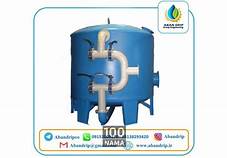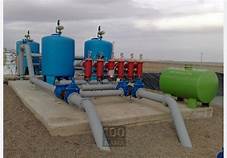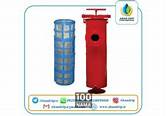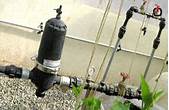Irrigation system In Pishva ( implementation consultation )
You can introduce your business services or products in this section.
For this purpose, be in touch with us.
In closed loop systems, the operator develops a general control strategy. Once the general strategy is defined, the control system takes over and makes detailed decisions on when to apply water and how much water to apply. This type of system requires feedback from one or more sensors. Irrigation decisions are made and actions are carried out based on data from sensors. In this type of system, the feedback and control of the system are done continuously. Closed loop controllers require data acquisition of environmental parameters (such as soil moisture, temperature, radiation, wind-speed, etc) as well as system parameters (pressure, flow, etc.).
This is an intermittent gravity-flow irrigation system. It has been used almost exclusively for small-scale agriculture and domestic gardening. Prior to the development of this technology, electronically controlled valves were used to produce intermittent water flows for irrigation. These valves are expensive and require some technical training to operate. The siphon replaces these valves with a device that would be more cost-effective and easier to operate and maintain with a minimum consumption of energy. The system consists of a storage tank equipped with one or more siphons (see figure below) (UNEP ). The water in the tank flows to the field because of the siphon effect. As soon as the tank is empty, the flow stops. For the next irrigation process, the tank has to be filled-up to restart the siphon effect again. To learn more about possible siphon designs see VORTECH ().
An automated irrigation system refers to the operation of the system with no or just a minimum of manual intervention beside the surveillance. Almost every system (drip, sprinkler, surface) can be automated with help of timers, sensors or computers or mechanical appliances. It makes the irrigation process more efficient and workers can concentrate on other important farming tasks. On the other hand, such a system can be expensive and very complex in its design and may needs experts to plan and implement it.
RAIN was founded in as a family company and continues to be a family run business even today. RAIN focus has always been to efficiently irrigate any landscape through automatic systems helping to save water. The company prides itself on its green credentials, through a sustainable office and production facility, and on the innovative and technical specification of products represented and manufactured by RAIN.
In an open loop system, the operator makes the decision on the amount of water to be applied and the timing of the irrigation event. The controller is programmed correspondingly and the water is applied according to the desired schedule. Open loop control systems use either the irrigation duration or a specified applied volume for control purposes. Open loop controllers normally come with a clock that is used to start irrigation. Termination of the irrigation can be based on a pre-set time or may be based on a specified volume of water passing through a flow meter.





